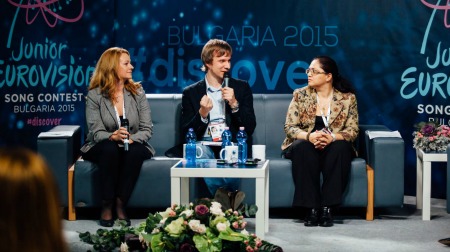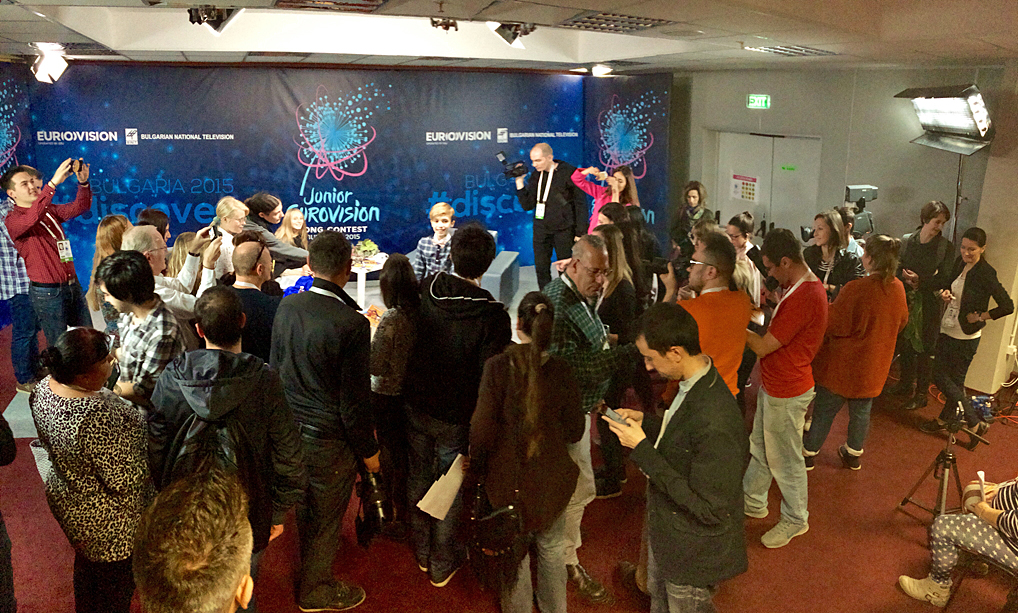Jon Jacob joined the ESC Insight team in Sofia for this week for his first ever Junior Eurovision.
In the post he wrote before he left the UK he was expecting precocious kids, over-reaching parents, dire songs and an empty arena. Having seen a handful of the rehearsals and spoken to a few of the key-players, what does he think of it now?
After modest exposure to the Junior Eurovision, what have I discovered?
As I expected, most of my preconceptions were ill-conceived. The running order isn’t populated by musical wannabees as desperate for fame as their parents are. Nor is the arena on Saturday night going to be empty – I didn’t plan ahead and buy a ticket before I got here and now, as a result, will almost certainly be watching the show in my hotel room.
Yes, some of the songs are dire (Montenegro’s song is a breath-taking crime against melody, and Georgia’s is another reminder about how unison shouting into the microphone really is unforgivable) – but on the whole there are a good many songs which stand out as rather good, performed by self-assured authentic teenagers who haven’t been made-over to look like adults and whose backdrops are modest but complimentary.
That isn’t all I’ve discovered here, however. Some of the other insights I’ve scribbled down in my notebook have taken me by surprise.
It’s Not Weird, It’s Lovely
Junior Eurovision isn’t anywhere near as weird as I thought it would be. It hasn’t been uncomfortable watching young children perform on stage. I haven’t once turned away from the screen in horror like I do often during the main Eurovision contest (no, not even during Montenegro’s song). On the contrary, there is a warmth about the Arena Armeec and the delegates hotel. And that’s because there’s an infectious enthusiasm amongst the participants and their supporting delegations. Children and teenagers are being given the space to do what they want to do. And when they do that they smile and emote. That warmth isn’t tangible or measurable, but it is infectious and when you haven’t been in and around that kind of energy before, sometimes it can hit your emotional button without warning.
I didn’t cry during Serbia’s ‘press conference’, but I was massively touched. It’s difficult to be cynical about whether or not a kid has been briefed by a PR when you witness them speak what they think and feel about the experience they’re having. Asked what her song Lenina pesma was inspired by, singer Lena Stamenkovic explained that it was in response to the migrant crisis she’d heard about in the news. “It made me feel sad, and I wanted the lyrics to reflect that.” The black and white of digital copy won’t convey the tone of her disturbingly mature yet authentic delivery nor how unexpected the insight was in amongst what was quite a cumbersome event. Even so, it was important learning point for me: in an increasingly fast-paced, judgmental age, we overlook the emotional intelligence of our teenagers. We do them a disservice.
Some Have Failed To Meet Expectations
Let’s not get carried away. Some journalistic principles should apply. Not at all of the ‘press conferences’ I attended were quite so insightful. San Marino’s was equally cumbersome but in fairness to singer Kamilla Ismailova, she is 11 years old and the presenter was asking her a lot of closed questions. The Netherlands’ 15 year old Shalisa showed her experience in her poise and openness, answering all but one of the questions put to her with an infectious charm and openness. “What was the first Eurovision you remember watching?” I asked her. “I don’t understand the question.” Crushing.
Hearing the performers speak in an authentic way humanises them in a way that the parent Eurovision contest never will be able to. At the same time, its possible to gauge which country considers this an important TV event to succeed act. That country would be Russia, who during 12 year old Mikhail Smirnov’s ‘press conference’ wowed the handful of journalists and considerable delegation members with his effortless charm. Much murmuring could be heard from the assembled audience, who commented on Mika’s responses in hushed Russian whispers. I was certain I saw at least three or four women in the room who looked on with so much pride I was convinced all of them must have been his mother.
Mika’s performance of his song ‘Dream’ is perhaps the one song I wriggle uncomfortably on my seat when I watch. The boy is fresh-faced and his stagecraft is polished. Almost too polished, in fact. There are times when he does look like a small adult. The knee bends he deploys for his top notes and the expressive arms he flings out are so slick and professional that it’s as if all traces of any childlike demeanour have been ironed out when his costume was hung out in his dressing room. His is an incredibly polished and assured performance, but there’s a lack of authenticity and sincerity to the finished act which ends up detracting from what is in actual fact, a pretty good song.
What The Boss Man Says Is True

(l-r: BNT Director General Viara Ankova, Junior Eurovision Executive Supervisor Vladislav ‘Vlad’ Yakovlev & BNT Executive Producer Joana Levieva-Sawyer)
Photo: junioreurovision.tv
Distinctiveness and authenticity were two defining characteristics of Junior Eurovision which present Executive Supervisor Vladislav Yakovlev was keen to underline when I spoke to him. Since taking on the role “I wanted to make sure that we moved away from the acts that were made-up to look like adults,” he explained, “I’ve worked with heads of delegation from all of the countries to make the show look right.”
‘Vlad’ is softly spoken but focussed about what he wanted to achieve with Junior Eurovision. And there was an enthusiasm for the programme and the way it brought performers together socially. Like everyone at the delegate’s hotel after rehearsals, any notion of Junior Eurovision seemed to be lost on everyone. At best, everyone was making a television show together. “They’re all winners,” said Vlad to me. And he means it too.
Was This How It Used To Be?
There is a sense – perhaps a wish? – that the low-key, innocent charm that the Junior Eurovision exudes harks back to what the ‘Adult Eurovision’ was in its early years: not quite sure of itself, but propelling itself on the importance that everyone participating is having a good time.
It’s difficult to imagine that Junior Eurovision will ever scale the heights of Europe-wide popularity the spring Contest does. That’s in part because (I now realise) that so much of the excitement around Eurovision in May is brought about by the many different audiences who converge in the host city or get whipped up into a house-partying frenzy at home.
What Junior Eurovision needs is a notable story to make the competition hit the mainstream press. Still in its formative years (the contest is as old as its youngest performer, just about) its going to have to wait for the king of all stories – a JESC winner going on to win Eurovision itself. But when that day comes, it will undoubtedly invigorate the brand.
And The Winner Is … ?
As I sit to write this I’ve realised that there’s one thing about Junior Eurovision which has absolutely surprised me. I’ve not heard anyone speculate who will win the competition. I’ve not even posed the question to myself or others. Such idle speculation seems both redundant and a little crass. No-one wants to be seen to be making money out of children or teenagers some of whom are open about following their dream of performing on a big stage.
There might also be another reason why the idea of who the winner will be isn’t important: there isn’t the pressure on a winning country to host the following year’s contest. Conversely that means there’s an opportunity for a country to host Junior Eurovision even if they don’t win (as with Bulgaria this year).
Which then makes me wonder whether the time has come for the same rule relaxation to be introduced into the Junior Eurovision’s parent competition? Or am I just thinking like a madman?









